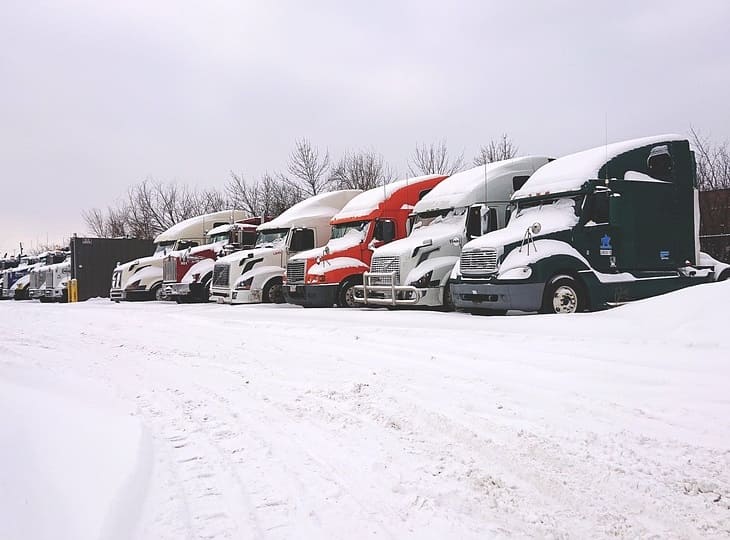
If your semi truck won’t start in cold weather, it may be due to issues with the fuel system or the battery. Cold temperatures can cause diesel fuel to thicken, reducing its flow and leading to starting problems.
Additionally, cold weather can also affect the battery’s ability to provide enough power to start the engine. It’s important to address these issues promptly to avoid disruptions to your fleet’s operations and ensure the safety of your drivers. We will explore common reasons why semi trucks won’t start in cold weather and provide practical solutions to address these issues.
By understanding these factors, you can take proactive measures to keep your semi trucks running smoothly in all weather conditions.
Navigate As You Want:
- Common Reasons For A Semi Truck Not Starting In Cold Weather
- Solutions To Resolve Starting Issues In Cold Weather
- Preventive Measures To Avoid Starting Problems In Cold Weather
- Tips For Starting A Semi Truck In Cold Weather
- Emergency Procedures When A Semi Truck Doesn’t Start In Cold Weather
- Frequently Asked Questions Of Semi Truck Won’t Start Cold
- Conclusion
Common Reasons For A Semi Truck Not Starting In Cold Weather
There can be several reasons why a semi truck won’t start in cold weather. One common cause is a weak or dead battery. Cold temperatures can reduce the battery’s ability to hold a charge, making it difficult for the engine to start. It’s important to keep the battery terminals clean and free from corrosion to ensure proper connections.
Fuel system issues can also prevent a semi truck from starting in cold weather. Cold temperatures can cause fuel to thicken or gel, making it difficult for the engine to receive the fuel it needs. Using a winter-blend fuel or adding a fuel anti-gel additive can help prevent this problem.
Frozen fuel lines can also contribute to starting issues in cold weather. When the fuel lines freeze, fuel cannot flow properly to the engine, causing starting problems. Using fuel additives or parking the truck in a heated area can help prevent fuel line freezing.
Faulty glow plugs can be another culprit. Glow plugs help heat the combustion chamber in diesel engines for easier starting. If the glow plugs are not functioning properly, the engine may struggle to start in cold weather. Regular maintenance and replacing faulty glow plugs can help resolve this issue.
Lastly, ignition problems can prevent a semi truck from starting in cold weather. Faulty ignition switches or spark plugs can hinder the starting process. Regular inspection and maintenance of the ignition system can help ensure that it is in good working condition.
| Common Reasons for Semi Truck Not Starting in Cold Weather |
|---|
| Weak or Dead Battery |
| Fuel System Issues |
| Frozen Fuel Lines |
| Faulty Glow Plugs |
| Ignition Problems |
Solutions To Resolve Starting Issues In Cold Weather
Use a Block Heater: Plugging in a block heater can help warm the engine oil and coolant, making it easier for the truck to start in cold weather.
Check and Charge the Battery: Ensure the battery is fully charged and in good condition to provide the necessary power for starting the truck in cold conditions.
Inspect and Replace Fuel Filters: Dirty fuel filters can restrict the flow of fuel, causing starting issues in cold temperatures. Regular inspection and timely replacement are crucial.
Thaw Frozen Fuel Lines: To resolve starting issues due to frozen fuel lines, using a fuel-line antifreeze solution or parking the truck in a heated area can help thaw the lines.
Replace Faulty Glow Plugs: Faulty glow plugs can hinder the combustion process in cold weather, causing starting problems. Regular inspection and replacement are essential.
Address Ignition System Problems: Any issues with the ignition system, such as faulty spark plugs or ignition coils, should be promptly addressed to ensure smooth starting in cold conditions.
Preventive Measures To Avoid Starting Problems In Cold Weather
Regular maintenance is key to preventing cold weather starting problems. Ensure the engine preheater or blanket is installed to keep the engine warm. Using fuel additives can help prevent gelling in cold temperatures. Keeping the fuel tanks full prevents condensation and water buildup. Parking in a sheltered or heated area can protect the truck from extreme cold.

Credit: www.middletonmeads.com
Tips For Starting A Semi Truck In Cold Weather
Starting a semi truck in cold weather can be a challenge. To ensure your truck starts smoothly, there are several tips to keep in mind:
- Allow sufficient warming time to ensure all the engine components are at the right temperature for proper ignition.
- Prime the fuel system by turning the ignition key to the “on” position without starting the engine, allowing the fuel pump to circulate the fuel and remove any air bubbles or impurities.
- Make sure the battery is fully charged to provide enough power for starting the engine in cold temperatures. Check the battery terminals and cables for any signs of corrosion or damage and clean or replace them if necessary.
- Use winter-grade diesel fuel that is specifically formulated to withstand the low temperatures, preventing it from gelling or becoming thicker.
- Consider using anti-gel additives that can further improve the low-temperature performance of the diesel fuel by preventing the formation of wax crystals that can clog the fuel filter and cause starting issues.
Emergency Procedures When A Semi Truck Doesn’t Start In Cold Weather
Sometimes, semi trucks can have trouble starting in cold weather. If you find yourself in this situation, there are a few emergency procedures you can follow. First and foremost, you should call a roadside assistance service who specialize in helping stranded vehicles. They can provide the necessary expertise and equipment to get your truck started. Another option is to use jump start cables. By connecting the dead battery to a working vehicle, you can transfer power and potentially start the truck. It’s also a good idea to have a spare battery or battery booster pack on hand for emergencies. These devices can provide an extra power source when the truck’s battery is depleted. Finally, if all else fails, it’s important to consult with a professional mechanic who can diagnose and fix any underlying issues causing the truck’s starting problem.

Credit: open.spotify.com

Credit: logitydispatch.com
Frequently Asked Questions Of Semi Truck Won’t Start Cold
Why Does A Semi Truck Not Start In Cold Weather?
When the temperature drops, it can affect the performance of the battery, fuel, and various engine components. Cold weather can cause the battery to lose power, thickened fuel can lead to ignition problems, and the engine oil can become too viscous to circulate properly.
What Can I Do To Help My Semi Truck Start In Cold Weather?
To improve the chances of your semi truck starting in cold weather, make sure to have a fully charged battery, use winter-grade fuel, ensure proper engine block heating, and maintain the correct viscosity of engine oil. Regular inspections and maintenance play a crucial role in preventing cold weather starting issues.
How Can I Prevent Cold Starting Problems In My Semi Truck?
Keeping your semi truck in a sheltered, warm environment can help prevent cold starting problems. Using a block heater, fuel additive, and ensuring regular maintenance can also significantly improve your truck’s cold weather performance. Additionally, storing the truck with a full tank of fuel can reduce the chances of condensation forming in the tank.
Conclusion
To sum up, troubleshooting a semi truck that won’t start in cold weather can be a complex task. From inspecting the battery and starter motor to checking the fuel and ignition system, there are several potential causes to consider. By following the steps outlined in this blog post, you can identify the issue and take necessary measures to ensure your semi truck starts smoothly even in chilly conditions.
Always remember to consult a professional if needed. Stay diligent, and happy trucking!



